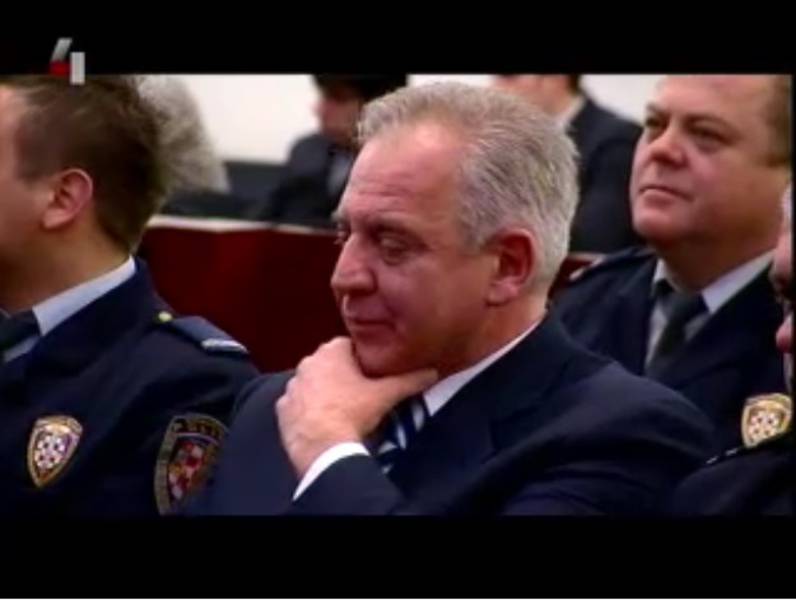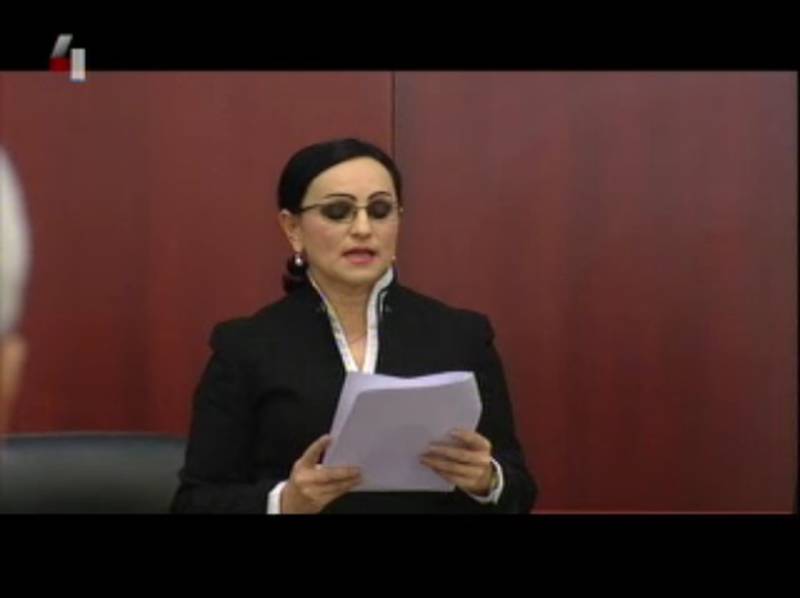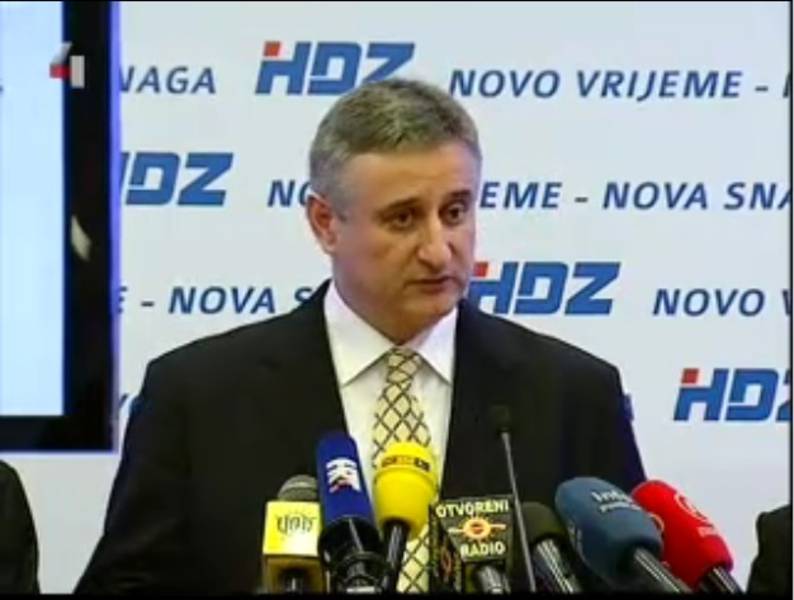The Croatian Precedent: First Political Party Convicted
Adelina Marini, March 13, 2014
 In spite of the Perkovic case, Croatia can nevertheless be the white swallow of enlargement. March 11th can be described as a "good day for the Croatian democracy" after the Zagreb District Court gave a lesson in justice in the broadest meaning of the word. A court council, chaired by Justice Ivana Calic, pronounced a sentence which could change forever the political culture in Croatia no matter if it will be confirmed by the Supreme Court or not. The decision is on the biggest anti-corruption trial in the country's newest history, known as Fimi Media after the name of the PR agency which two governments, led by ex-premier Ivo Sanader and his party Croatian Democratic Union (HDZ), worked with to embezzle millions of euro from state-owned companies to finance the party's black safe.
In spite of the Perkovic case, Croatia can nevertheless be the white swallow of enlargement. March 11th can be described as a "good day for the Croatian democracy" after the Zagreb District Court gave a lesson in justice in the broadest meaning of the word. A court council, chaired by Justice Ivana Calic, pronounced a sentence which could change forever the political culture in Croatia no matter if it will be confirmed by the Supreme Court or not. The decision is on the biggest anti-corruption trial in the country's newest history, known as Fimi Media after the name of the PR agency which two governments, led by ex-premier Ivo Sanader and his party Croatian Democratic Union (HDZ), worked with to embezzle millions of euro from state-owned companies to finance the party's black safe.
Beside the five defendants - Ivo Sanader, Mladen Barisic (treasurer of the HDZ), Ratko Macek (former spokesman of the government and head of the party's election staff), Branka Pavosevic (chief accountant of the party) and Nevenka Jurak (director of FImi Media) - before the court stood the party itself - HDZ - in its capacity as a legal entity. Mr Sanader got 9 years in prison and must pay back to the treasury more than 15 million kunas (circa 2 million euros) for establishing a criminal group with the aim to favour themselves and the party by collecting illegal money and covering revenues. Mladen Barisic received three years in prison as an accomplice. Ratko Macek got one year on parole which is valid four years, Branka Pavosevic will stay a year and a half in prison and Nevenka Jurak two years. To Ivo Sanader this is the second sentence. He has already been in prison for two years out of ten on a case for war profiteering.
Can a party be guilty?
Indisputably, the news this week is not the convictions of the five defendants on the Fimi Media trial, but the precedent in the Croatian (and may be not only) judicial and political practise a political party to be convicted for corruption. According to USKOK's charge [in Croatian language] (USKOK is the special bureau to fight corruption and organised crime attached to the office of the chief prosecutor), the party is accused of benefting to the amount of at least 46.6 million kunas (circa 6 million euros). The party is convicted to pay back the money it had benefited via illegal operations, estimated at 24 million kunas of which 7 million have already been paid in the beginning of USKOK's investigation. HDZ is convicted on the basis of articles 3 and 4 of the law on the penal responsibility of legal entities. They foresee penal prosecution of legal entities for crimes perpetrated by responsible individuals. The definition of a responsible individual in the law is a person who leads the legal entity and is entitled to perform its main functions.
This law, by the way, in itself marks a serious change in the Croatian legal culture. It was adopted far back in 2003 even before the country started accession negotiations with the EU (2005), following the then legal trends in the Union, as Dr Slaven Letica writes, a university professor and columnist. This law puts an end to a centuries long dogma that legal entities cannot bear penal responsibility. Dr Letica claims in his analysis [in Croatian language] in Vecernji list today that this legal dogmatics is still not available even in the Anglo-Saxon law.
After reading the sentence, which lasted more than an hour, Justice Ivana Calic sent a very strong signal to society. "This sentence is a message that political corruption is evil, that abuse of power to extract personal material or other benefits is shameful, is not tolerated and, in the end of the day, does not pay back. The first defendant [Sanader], with his behaviour, showed an attitude which is not an exception today in the political and public life, which is that there is a perception that politicians are above the law. In the period of the crime [the end of 2003 - January 2009], the legal entity HDZ was in powerр which means that because of a majority in the Sabor [parliament] it adopted laws, governed the state and its repressive apparatus among others. When this and such a legal entity violates the laws, it undermines the foundations of the rule of law because everyone should ask themselves what message is this to the citizens when those in power violate the laws but those who have elected them are required to obey them".
Justice Calic said that the court council firmly rejected the claims of the defence that an entire party cannot bear a responsibility for the quoted crimes. The motive:
"This is a message to all legal entities, political parties, therefore to their members, about what the responsibility of political parties is and that everyone will pay for their аееая, including those who are not directly involved in the specific crime. In this case, just like the heirs pay the debts of their predecessors, the parties' responsibilityр as legal entitiesр stems from natural persons who are responsible. The citizens who are deprived of rights, who became poor and вдяе belief in institutions because the greed of the so called elites has led those who elected them to misfortunes. This sentence is also a compensation because the convicts will pay back everything they took as benefits", said Ivana Calic.
The HDZ leader, Tomislav Karamarko, called an urgent press briefing even before the reading of the sentence had finished during which he made a very short statement and refused to answer questions. He rejected the principle of collective responsibility and said that the party удква appeal. According to him, hundreds of thousands of members cannot be held accountable for the misdeeds of a few from the elite. But the court believes differently: "Those who are guilty are not only these five people. Also responsible are all those who knew about this as well as those who in some way participated in this. Those who bent down their heads, who turned their heads away, those who closed their eyes and those who were silent about this. All of them silently supported such a way of functioning of the system and thus made it sustainable". The question now is will the Supreme Court accept these motives and will it confirm the sentence. It comes in a very difficult moment for HDZ precisely two months before the key elections for the European Parliament from a domestic political perspective. It is still not clear what consequences the court decision will have on the moods of the voters but on March 11th could be heard many disappointed positions that, in fact, the sentence of the party and the other defendants is too mild compared to the perpetrated crimes.
There were also opinions that the party should even be banned. This would serve a huge blow to a political formation which once was a symbol of Croatia's independence, led in the past by late President Franjo Tudjman during the independence war. Even today, the party's major ideology is reduced to "genuine" tudjmanism. HDZ is the longest ruling party in independent Croatia so far - from January 2003 until 23 January 2011. During this period, Ivo Sanader, as a party leader, governed two terms, but  resigned after his successor at the leadership Jadranka Kosor gave him to USKOK because of the well known accusations.
resigned after his successor at the leadership Jadranka Kosor gave him to USKOK because of the well known accusations.
No matter what the outcome of the Fimi Media trial will be, the first instance conviction marks a new period in the newest Croatian history - a period of restoration of citizens' confidence in the judicial and political system. And that was possible thanks to the independence of the judiciary. It can be proved by the fact that the Fimi Media trial began when HDZ was still in power and continued under the current government of the Kukuriku coalition of Zoran Milanovic's Social Democrats and Vesna Pusic's Liberals. And although there are people who disagree with the convictions and view them as too small, in general, in the Croatian public domain there is a feeling of revenge because both HDZ and Sanader will have to return money to the taxpayers.
Several lessons for Bulgaria
It is very important to note, in the Bulgarian context, that all this is happening months after Croatia joined the European Union on July 1st, 2013, WITHOUT monitoring over the judiciary and the fight against corruption, which shows that building institutions and rule of law is possible during the accession process. Against the backdrop of the terrible report of the European Commission under the special monitoring mechanism of the Bulgarian efforts to fight corruption and organised crime, Croatia's achievements are a real lesson in justice without external interference. Moreover, according to the first of its kind report on corruption in all the EU member states which the Commission presented in the beginning of February, Croatia is put in one group with Bulgaria and Romania. It is quite possible the Fimi Media trial to launch Croatia in the much more pleasant group of countries that fight corruption effectively.
The lessons that can be drawn for Bulgaria are that, first, in Croatia, money and property are frozen until the trials end and all judicial procedures are exhausted. This is not decided by a parliamentary committee but by USKOK. The defendants await in detention the end of the investigation, not somewhere around the world where they are later wanted to the expense of the European and Bulgarian taxpayers. Last but not least, the court puts its hand on accounts of the closest relatives of the defendants to prevent avoiding justice by transferring illegally acquired money to accounts of family members. In Sanader's case, the accounts of his wife and two daughters were also frozen. The court also estimated what part of the money and property of Sanader's family are acquired legally and separated them from the illegally acquired.
The second very important lesson is that the court sent a clear message to the political elite that no one is untouchable and that it is on society's side, as well as that it knows the price of political responsibility. The court sent a special message to citizens, too, telling them that corruption is evil, thus laying the foundations of intolerance not only against political corruption, but also against the so called "small" corruption. Finally, the lesson that without media the fight against corruption is practically impossible as it became clear during the special discussion on corruption organised by the European Commission representation in Zagreb right after the publication of the anti-corruption report. Media are  those who teach intolerance toward political corruption and hold politicians accountable for all their decisions.
those who teach intolerance toward political corruption and hold politicians accountable for all their decisions.
In this context especially telling is the comment [in Croatian language] of Predrag Lucic in the Novi list newspaper (a regional left-liberal daily from Rijeka). On the occasion of the really brief media statement by Tomislav Karamarko Lucic wrote that the most important thing that happened during this "news conference" was the clash between two Croatias: "one that wishes to decently do its job although it is not sure if it will get its indecently small salary for this and that, other, which is certain that it will get its indecently huge salary no matter what, even though it never shows up at work in the Sabor and did not answer a single question at the news conference wish is supposed to be an essential part of its quite expensive job".
And one more message by Justice Calic which is completely valid for Bulgaria. She said that during the trial, which lasted two years, it became clear how the process of appointments in state-owned companies happened when HDZ was in power. The criterion was obedience and not merits and those who were incapable to obey were replaced. "With its deeds the party was destroying confidence in the authorities creating the perception that politics is a lucrative business and that political corruption is rather a rule than an exception", Justice Calic said.
With its decision from March 11th, 2014, the Zagreb District Court put Croatia under entirely different light on the edge of the dark Balkans. Aside from being the first country in the region where an ex-premier is in prison, Croatia will also be the first to demand responsibility from a political party for corruption, abuse of office, undermining the foundations of the rule of law. Bulgaria is suffering of all these problems severely but seems unable to find strength to solve them. Croatia is also among the not too many countries which are quoted with "good practises" in the European Commission's anti-corruption report, which means countries whose experience is worth recommending.
The adoption far back in 2003 of a law on penal responsibility of legal entities shows that Croatia is prone to introducing the latest legal trends with the aim to adapt its law to local realities. If it continues on this path Croatia is facing a good future and even an exit from the recession, while the Commission can score a huge victory in its enlargement efforts.
 Kolinda Grabar-Kitarovic | © KGK
Kolinda Grabar-Kitarovic | © KGK Jozo Rados | © European Parliament
Jozo Rados | © European Parliament Aleksandar Vucic, Andrej Plenkovic | © Vlada RH
Aleksandar Vucic, Andrej Plenkovic | © Vlada RH